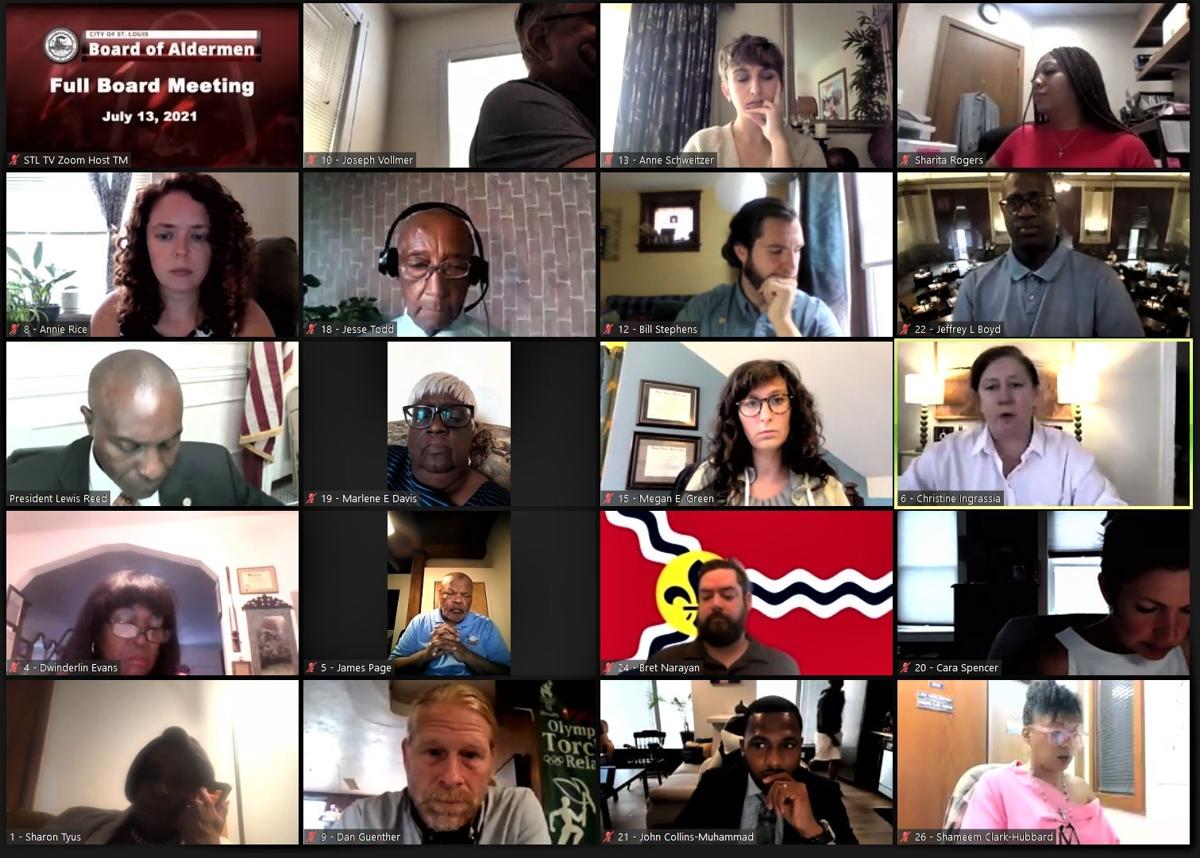ST. LOUIS ÔÇö One-time $500 payments for 10,000 residents affected by the pandemic and gift cards to entice people to get vaccinated against COVID-19 are part of a $168 million pandemic aid plan endorsed Tuesday night by the Board of Aldermen.
In a marathon debate on the plan, which consumed about 10 hours of a 12-hour meeting, the board voted to add $5 million in direct aid sought by Mayor Tishaura O. Jones and a $1.25 million gift card plan pushed by Aldermanic President Lewis Reed. Other money also was added to the bill, which was sponsored by Reed.
People are also reading…
Alderman Jeffrey Boyd, 22nd Ward, who handled the bill in floor debate, said the measure aims ÔÇ£to help ├█ª┐┤½├¢ become a better ├█ª┐┤½├¢.ÔÇØ
Aldermen, meanwhile, rejected a move to delete $2 million for so-called intentional encampments for homeless people who wonÔÇÖt go to traditional shelters.
But 12 of the cityÔÇÖs 28 wards were declared off-limits for the encampments, as requested by individual aldermen.
The package now moves to the Board of Estimate and Apportionment, the cityÔÇÖs top fiscal body, which previously endorsed an $81.4 million plan proposed by the mayor.
Jones, who pushed hard for aldermen to add $5 million for the direct aid proposal, said in a statement late Tuesday she was ÔÇ£proudÔÇØ that aldermen had agreed to the money and most of the rest of her proposals.
She said the bill will ÔÇ£boost vaccination rates, keep families in their homes and improve public safety by addressing the root causes of crime.ÔÇØ
But she didnÔÇÖt say whether sheÔÇÖll now support the aldermanic version at the estimate board.
The measure also includes $33 million earmarked to jump-start business development along four major north ├█ª┐┤½├¢ commercial strips that Jones said earlier Tuesday doesnÔÇÖt meet federal guidelines for using American Rescue Plan Act money approved by Congress.
Jones, citing advice from city attorneys and accountants, said the federal rules donÔÇÖt allow the aid to be allocated to general economic development.
ÔÇ£The most recent U.S. Treasury guidance indicates general economic development is not an allowable use of the ARPA funds as a general rule,ÔÇØ interim City Counselor Matt Moak said in a memo released before the meeting by JonesÔÇÖ office.
Boyd, who had pushed for the $33 million allotment, added an amendment to relabel the corridor funds as ÔÇ£economic empowerment fundsÔÇØ in an effort to remove the legal cloud. However, the mayorÔÇÖs office said later that the amendment didnÔÇÖt achieve that.
MoakÔÇÖs opinion also said a $20 million citywide housing development fund included in the bill wouldnÔÇÖt follow federal guidelines.
The bill passed by aldermen also includes $5 million for police overtime pay, essentially restoring $4 million in police allocations cut from the regular city budget at JonesÔÇÖ request.
Jones had asked in a meeting with Reed on Monday to reduce the amount in the pandemic bill to $2 million, a Reed aide had said. The measure also includes at JonesÔÇÖ request increased amounts for neighborhood violence prevention initiatives such as Cure Violence.
The amendment adding the direct payment money sought by Jones was approved 17-10 after the mayor agreed to put it in joint control of the city human services department and city treasurerÔÇÖs office.
Jones originally had wanted the treasurer, the post she used to hold before she was sworn in as mayor in April, to be solely in charge.
In another change agreed to by Jones, the human services agency will work with local universities and ÔÇ£a technical assistance partnerÔÇØ to study the programÔÇÖs impact and design to improve its effectiveness.
Reed said in a statement that he had worked with Alderman John Collins-Muhammad, 21st Ward, the amendmentÔÇÖs sponsor, ÔÇ£as a form of compromiseÔÇØ with Jones to help move the overall bill forward. Reed, however, voted against the direct payment amendment himself.
The gift card plan, approved 26-1, will provide prepaid debit cards worth up to $100 to try to improve the cityÔÇÖs lagging coronavirus vaccination levels.
Jones had originally requested the homeless encampment money but following pushback from many aldermen supported the unsuccessful amendment Tuesday to redirect the money to ÔÇ£tiny homeÔÇØ villages for the homeless.
Aldermen on Tuesday also approved adding $5 million to allow the city Election Board to upgrade its software and equipment so residents will be able to vote at any polling place in the city ÔÇö not just the one near their residence. ├█ª┐┤½├¢ County began allowing that last year.
The board also voted to allocate $2.75 million more to a city program that sends mental health and social workers on some 911 calls; the bill already had $2.25 million for that purpose.
ReedÔÇÖs plan includes much of the $81.4 million in spending recommended by Jones but has some major additions, including the development aid.
The overall bill was given preliminary aldermanic approval on a 27-1 vote.
The city is set to get $498 million in federal money over two years under the plan passed by Congress, with about $249 million already received. The bill endorsed Tuesday is the first installment of the $249 million.
The measure requires all contracts carried out with the money to be issued through a competitive process.
The bill also prohibits marketing materials related to the funds from including the ÔÇ£image, name or likenessÔÇØ of any elected official in the city.















